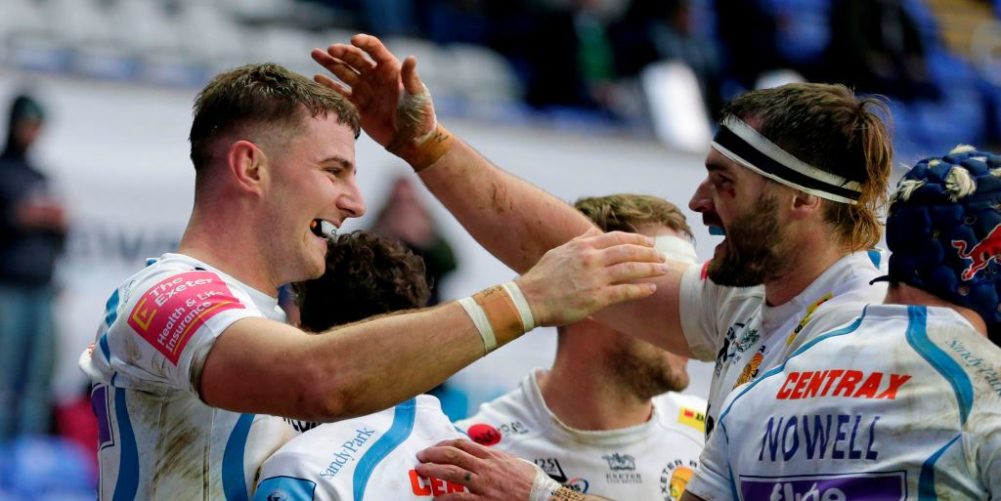THERE is such a Grand Canyon-sized gap in standards between Exeter and Saracens, as the pacesetters, and the other ten Premiership clubs, that claims of it being the most competitive league around seem outdated.
Last season, Exeter and Saracens finished streets ahead to claim the two home play-off semi-finals before meeting in the final, and this time, everything being equal, they would be odds-on favourites to contest the final again.
However, the 35 point salary cap penalty probably means that Saracens – who are currently bottom of the table despite sharing a won six lost two record with first-placed Exeter and second-placed Northampton – will miss out on the play-offs.
This gives other clubs the chance to rise up the rankings, but only Northampton have taken up the challenge. The quality of performance from clubs in fourth position down 11th is so poor that it is hard to see them challenging Exeter. They make far too many mistakes, because their basic skills and levels of concentration are not good enough.
The whole point of academies is to improve the level of skills, but I cannot ever remember such differential between the top two teams in the Premiership and the rest – and if Northampton can keep it going it is hard to look past and Exeter versus Saints final.
The league may be competitive statistically, but below two top teams, realistically, it is not competitive. There is a small chance that either Gloucester, Bath or Bristol might win five or six successive games, but no one really expects it to happen.
What this shows is that the template for a strong Premiership club starts with the front five – and to achieve that you need real depth in all the front row positions, and also in the second row. That's why your eight-man bench, of whom half are usually front five forwards, is so important in the modern game.
It's a surprise that not all clubs make this a priority, because the scrum and line-out are closed skills that you can practice to near perfection when you are a full-time professional – and in that sort of environment there are no excuses.
The effectiveness of your back row, and your backline, depends so much on the quality of your set-piece platform. For instance, the life of your tactical generals at 9 and 10 is made so much easier if they can execute off front-foot ball – and then, from 11 to 15, it's all bells and whistles.

So, why is there so much inconsistency from so many Premiership clubs? Is it because coaches have not given enough autonomy to the players to run a game? Or is it that the players lack either the character, or are not bright enough to use their initiative?
It could be because the coaches at most Premiership clubs are too autocratic. Some players are scared of conflict, but in my experience there has to be a little bit of edge between the coach and players when it comes to working out which tactical strategies are effective on the pitch, and which need some fine tuning.
It's no good if everyone is nodding in agreement rather than communicating with the coach and letting him know where it could be better.
Rob Baxter was a player at Exeter before moving into coaching, and that has enabled them to be consistent in a number of areas. They got their recruitment right, and have developed a style which plays to their strengths.
Another factor that stands out is that both Exeter and Saracens are clubs that have a reputation for having coaches that improve players – and not enough other Premiership clubs can say the same.
Mark McCall came into Saracens as an assistant coach alongside Brendan Venter when he started a cultural change at the club a decade ago. Over the last ten years as DoR one of McCall's big achievements is getting the buy-in from the players and cementing that culture.
When you listen to Alex Sanderson, his forwards/defence coach, you also get the sense of players and coaches communicating.
There is no one-size-fits-all way of developing a lasting culture. At Toulon they appeared to get it right with the help of Jonny Wilkinson – and did it despite the excesses of Mourad Boudjellal.
New Zealand did it by going back to the concept of what it is to be an All Black. From this came the idea that All Black players past and present are custodians of the jersey, stressing that it is on loan to players rather than being something that they own.
Stuart Lancaster tried to follow a similar route after 2011 when he tried to reconnect his squad to England teams of the past by bringing in internal squad awards such as the one for bravery named after the England international, Arthur Harrison VC.

You get the feeling Chris Boyd knew when he arrived at Northampton that he had to strike up a good relationship with the players quickly, but I suspect he also took the view that he had to be respected rather than liked.
That reputation of being hard but fair is a very difficult balance to achieve – and you can tell that by just how few Premiership coaches have been truly successful. You had Dean Richards at Leicester, and Warren Gatland and Shaun Edwards at Wasps, before the recent Saracens dominance achieved by McCall and his coaching team.
What we do know is that you can lose a culture very quickly, especially if you lose a number of coaches and players all in one go who understood it well. Look at how Leicester, Wasps and Bath have gone downwards since their heyday.
Leicester are a good example because with the number of players and coaches who have left recently there's been very little stability.
The Tigers have some quality players, but Geordan Murphy is a very inexperienced head coach, and the club are faced with having to re-establish their culture. That can take at least a couple of seasons – but not all coaches are given that amount of time.
It is also very difficult for clubs to take a step back and look in from the outside to see what they are getting wrong. They are in a seven-day repeat bubble, and it is hard to see the big picture in those circumstances.


























